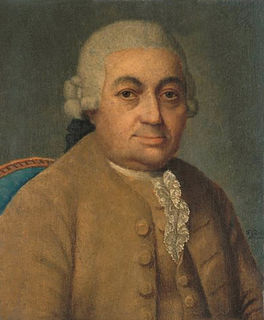A Quote by Friedrich Schiller
He cannot complain of a hard sentence, who is made master of his own fate.
Related Quotes
There will be no one like us when we are gone, but then there is no one like anyone else, ever. When people die, they cannot be replaced. They leave holes that cannot be filled, for it is the fate - the genetic and neural fate - of every human being to be a unique individual, to find his own path, to live his own life, to die his own death.
Brotherly love is not a tangible commodity. We cannot touch it or weigh it, smell it of taste it. Yet it is a reality; it can be creative, it can be fostered, it can be made a dynamic power. The Master who has it in his Lodge and his brethren will find that Lodge and brethren give it back to him. The Master too worried over the cares of his office to express friendliness need never wonder why his Lodge seems too cold to his effort.
The principal, the only, thing a man makes, is his condition of fate. Though commonly he does not know it, nor put up a sign to this effect, "My own destiny made and mended here." (Not yours.) He is a master workman in the business. He works twenty-four hours a day at it, and gets it done. Whatever else he neglects or botches, no man was ever known to neglect this work. A great many pretend to make shoes chiefly, and would scout the idea that they make the hard times which they experience.
Where is fate and who is fate? We reap what we sow. We are the makers of our own fate. None else has the blame, none else has the praise. We make our own destiny.
The Christian is not to become a Hindu or a Buddhist, nor a Hindu or a Buddhist to become a Christian.
Each must assimilate the spirit of other religion and yet preserve his individuality and follow his own law of growth.
Writing is linear and sequential; Sentence B must follow Sentence A, and Sentence C must follow Sentence B, and eventually you get to Sentence Z. The hard part of writing isn't the writing; it's the thinking. You can solve most of your writing problems if you stop after every sentence and ask: What does the reader need to know next?
A dog will recognize his master in whatever way he dresses. The master may dress in robes, suit and tie, or stand naked, but the dog will always recognize his master. If we cannot recognize God, our beloved master, when he comes in a different dress from another religion, then we are less than that dog.
We are and remain such creeping Christians, because we look at ourselves and not at Christ; because we gaze at the marks of our own soiled feet, and the trail of our own defiled garments.... Each, putting his foot in the footprint of the Master, and so defacing it, turns to examine how far his neighbor’s footprint corresponds with that which he still calls the Master’s, although it is but his own.




































